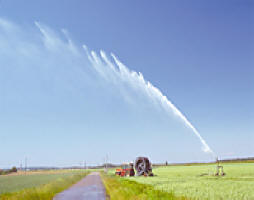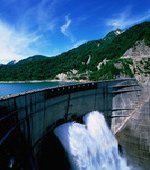 Recycled water from ‘managed aquifer recharge’ safe for irrigation
Recycled water from ‘managed aquifer recharge’ safe for irrigation
The health risks to humans of using recycled water to irrigate crops needs to be carefully managed. New research has demonstrated that ‘managed aquifer recharge’ can be just as effective as conventional water treatments in improving the quality of recycled water for use in irrigation.
The high demand for water to irrigate crops is considered a major obstacle to further economic development. In ‘managed aquifer recharge’ (MAR), recycled water is added to underground aquifers (layers of rock that soak up water) either by injection or infiltration, to ensure a constant supply of ground water that helps meet irrigation demands. Often MAR can improve the quality of the recovered water by filtering out potentially harmful microbes; however, few studies have quantified the human health risk from using reclaimed water for irrigation.
When using recycled water, it is important to carry out risk assessments and evaluate risk management. Therefore, international experts, assembled by the WHO, have requested that guidelines for water re-use, which include irrigation, are made into a single ‘Safe Water’ framework, which uses a Quantitative Microbial Risk Assessment (QMRA).
The study, conducted under the EU RECLAIM WATER project1, used a QMRA to investigate the risks posed to human health when using MAR as irrigation. Four study sites were selected which used recycled water for MAR. These sites were: Bolivar (Australia), Nardò; (Italy), Sabadell (Spain) and Shafdan (Israel). The researchers focused on three disease-causing microbes, rotavirus, representing viruses; Cryptosporidium, representing protozoa; and Campylobacter, representing bacteria. These pathogens were selected because they pose the highest risk to the population.
The risk to humans was calculated for three different types of exposure to microbes in the recycled water: farm-workers could accidently inhale particles of the water, local residents could also accidently inhale the particles and end-consumers could be exposed to the reclaimed water when they eat the crops irrigated with reclaimed water.
The QMRA used the measurement known as ‘Disability Adjusted Life Years’ (DALYs), as recommended by the World Health Organization (WHO). This metric indicates the possible life lost due to death from disease, alongside the number of years of ‘productive’ life lost due to people becoming ill as a result of infection.
The results suggest that the health risks for each site, microbe and exposure scenario were acceptable (with a median risk of less than 1.0 x 10-6 DALYS per person per year), except for the Nardò site, where the risk from Campylobacter was too high. For the different exposure scenarios, accidental ingestion by growers posed the highest risk, whereas the consumption of crops posed the lowest. Drip irrigation, as opposed to the use of sprinklers, can reduce the risk to growers. If drip irrigation was used at the Nardò; site, the researchers suggest that the risks posed by the bacteria would become acceptable.
The researchers compared MAR’s effects on microbe levels in recycled water with the effects of a wide range of different water treatment methods including chlorination, UV treatment and sand filtration, which were also present at the different sites studied. MAR resulted in the greatest human health risk reduction. In particular, it was found that the human health risk is lower the longer that the reclaimed water spends in an aquifer. Aquifers can thus be a very important tool for water recycling and irrigation management.
| Contact information |
Ayuso-Gabella, N., Page, D., Masciopinto, C., et al (2011) Quantifying the effect of Managed Aquifer Recharge on the microbiological human health risks of irrigating crops with recycled water. Agricultural Water Management. 99: 93-102.
(email: mnayuso@ub.edu; mneusag@yahoo.es) |
|---|---|
| News type | Inbrief |
| File link |
http://www.reclaim-water.org |
| Source of information | RECLAIM WATER was supported by the European Commission under the Sixth Framework Programme. (Ayuso-Gabella, N., Page, D., Masciopinto, C., et al (2011) Quantifying the effect of Managed Aquifer Recharge on the microbiological human health risks of irrigating crops with recycled water. Agricultural Water Management. 99: 93-102.) |
| Keyword(s) | Agriculture, Environment and health, Resource efficiency, Water |
| Subject(s) | AGRICULTURE , ANALYSIS AND TESTS , CHARACTERISTICAL PARAMETERS OF WATERS AND SLUDGES , HEALTH - HYGIENE - PATHOGENIC MICROORGANISM , HYDRAULICS - HYDROLOGY , MEASUREMENTS AND INSTRUMENTATION , PREVENTION AND NUISANCES POLLUTION , WATER QUALITY |
| Geographical coverage | n/a |
| News date | 08/06/2012 |
| Working language(s) | ENGLISH |
 you are not logged in
you are not logged in





